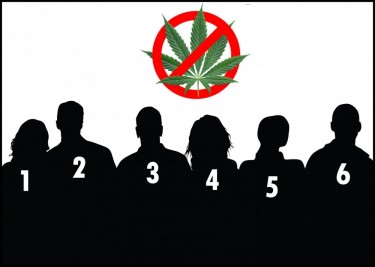
The issue of marijuana banking has been a longstanding concern within the cannabis industry. Despite previous bipartisan support in the House of Representatives, the SAFE Banking Act has faced challenges reaching the president's desk. However, there is optimism that the current situation may differ.
Are you going to fall for the "banana in the tailpipe", again as far as SAFE Banking is about to pass?
Cannabis.net has always stood by the statement that, "Weed will be federally legally, when Mitch McConnell say so."
Now, proponents of the SAFE Act say they have the Repubican votes to pass the act in the Senate, where anti-pot legend Mitch McConnell rules with an iron fist. Why is there optimism that is the time that the SAFE Act can pass? Has Mitch changed his mind? Is Big Pharma now positioned well and they have given the go ahead to let it pass?
On Benzinga.com, insights from Rob Sechrist, the Co-Founding President of Pelorus Capital Group and a notable member of the Senate Banking Committee, suggest that the Committee is currently examining the SAFE Banking legislation. Having conducted a hearing in May, the necessary ten votes to pass the bill successfully in a potential Senate floor vote. This indicates a possible shift in the outcome compared to previous attempts.
During a recent meeting, Mr. Sechrist engaged with Senator Steve Daines (R-MT), a fellow member of the Senate Banking Committee and co-sponsor of the SAFE Banking Act. While the meeting covered various topics, the discussion touched upon the SAFE Banking Act.
In no uncertain terms, Rob Sechrist shares that "Senator Daines confirmed to me that he does have the ten votes necessary (for SAFE Banking Act passage)." Sechrist further notes that Senator Daines expressed considerable confidence, suggesting he has more votes than required for the bill's successful passage.
Suppose the Committee markup vote garners majority support within the next few weeks. In that case, the prospects of a floor vote on the SAFE Banking Act will significantly improve. During the markup session, committee members can propose changes to the bill's language, include or exclude provisions, or make other adjustments based on their policy preferences or concerns.
Senate Banking Committee Chairman Sherrod Brown (D-OH) has indicated that the Committee will soon proceed with the markup of the SAFE Banking Act.
Once the SAFE Banking Act reaches the Senate floor, senators will have the opportunity to engage in meaningful debate, thoroughly discussing the bill's provisions, merits, and potential consequences. During this stage, senators can propose amendments, potentially creating a bottleneck if numerous social justice or unfavorable amendments are added. This scenario could discourage Republican senators who currently support the bill.
However, according to industry insiders, the SAFE Banking legislation, in its current form within the Committee, enjoys sufficient support to overcome such challenges. It is important to note that this assumes unanimous support from all Democratic senators and senators caucusing with the Democrats when voting on the legislation on the floor.
10 Vital Republican Votes Needed to Pass SAFE Banking Legislation
In the Senate, obtaining 60 votes to pass a bill is related to a procedural rule called the filibuster. This rule permits senators to prolong or obstruct legislation by speaking for an extended period, effectively blocking a vote unless a supermajority of 60 senators agrees to end the debate and proceed to a final vote.
The requirement for a supermajority in the Senate may be confusing for some, as the House only requires a simple majority to pass legislation. This discrepancy stems from how the nation's Founders designed the system, aiming to foster collaboration between political parties.
The intention behind the 60-vote threshold in the Senate was to foster a sense of bipartisanship and ensure that the majority party seeks some level of support from the minority to pass legislation. This requirement encourages collaboration within the legislative branch.
Once a bill reaches the Senate floor for a vote, it requires a simple majority of 51 votes to pass after the conclusion of the debate. However, 60 votes are needed before the vote to end the debate, making a 60-vote supermajority the practical minimum for successful legislation passage in the Senate.
Possible Revision to the Measure
It remains to be seen whether any revisions will be proposed for the measure during the committee markup, whenever it takes place. However, at least one Democratic senator on the panel wants to change the primary banking provisions.
Senator Jack Reed (D-RI) and certain consumer groups have voiced concerns regarding Section 10 of the bill, highlighting potential unintended consequences that could restrict regulators' ability to address individuals who exploit banking services. Earlier, Chairman Brown expressed concerns about banking representatives leveraging the legislation to weaken bank regulations and undermine existing regulatory frameworks.
Additionally, there have been suggestions from various quarters to introduce additional amendments to the cannabis bill. These proposals include expanding protections to facilitate broader access for the marijuana industry to all types of financial services and even exploring the possibility of allowing representation on major U.S. stock exchanges.
The request to expand the cannabis bill's provisions to aid businesses has received criticism from certain advocates who argue that such a move would be inappropriate, while broader efforts to legalize marijuana face hurdles in Congress.
In a recent incident, a prominent cannabis lobbying firm apologized for sending a letter to Senate Banking Committee leadership. The letter contained "inappropriate" references to Chinese investments. It was deemed a misguided attempt to advocate for amendments that would broaden the scope of the legislation.
In a recent statement, Senator Jacky Rosen (D-NV) expressed her support for the passage of the SAFE Banking Act. She specifically advocated for an amendment enabling cannabis businesses to access federal Small Business Administration (SBA) services. Senator Rosen's proposal seeks to expand opportunities for cannabis entrepreneurs to benefit from essential resources and support provided by the SBA.
Conclusion
The issue of marijuana banking has been a longstanding concern for the cannabis industry. While previous attempts to pass the SAFE Banking Act have faced challenges, there is renewed optimism for its success. Insights from industry insider Rob Sechrist indicate that the Senate Banking Committee has the necessary votes to pass the bill.
A markup session will allow committee members to propose changes and adjustments based on their policy preferences. Senate Banking Committee Chairman Sherrod Brown has confirmed that the Committee will proceed with the markup. Once the bill reaches the Senate floor, senators can debate and propose amendments.
However, 60 votes to end the debate pose a potential hurdle. Nonetheless, the current level of support for the bill suggests that it may overcome any challenges. Additionally, there have been discussions regarding possible revisions, including expanding protections and enabling cannabis businesses to access federal Small Business Administration services.
WHAT SENATORS ARE BLOCKING CANNABIS LEGALIZATION, READ ON...
6 SENATORS BLOCKING CANNABIS LEGALIZATION IN AMERICA!







